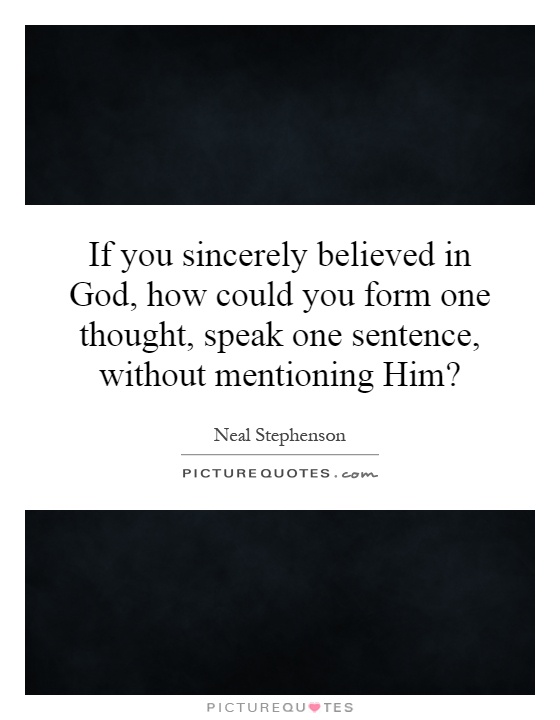If you sincerely believed in God, how could you form one thought, speak one sentence, without mentioning Him?

If you sincerely believed in God, how could you form one thought, speak one sentence, without mentioning Him?
Neal Stephenson is a renowned science fiction author known for his intricate and thought-provoking novels that often delve into complex philosophical and technological themes. In his works, Stephenson often explores the intersection of religion, science, and technology, posing questions about the nature of belief and the role of faith in a rapidly changing world.The quote, "If you sincerely believed in God, how could you form one thought, speak one sentence, without mentioning Him?" raises an interesting point about the relationship between faith and language. For many people who hold strong religious beliefs, God is at the center of their worldview and influences every aspect of their lives. In this context, it would be difficult to imagine a conversation or thought process that did not somehow touch on the divine.
Stephenson's own views on religion are complex and nuanced, as evidenced by his novels such as "Snow Crash" and "Anathem," which explore themes of spirituality, belief, and the nature of reality. In these works, Stephenson presents a world where technology and religion coexist in sometimes uneasy harmony, raising questions about the nature of faith and the limits of human understanding.
For Stephenson, the idea of mentioning God in every thought or sentence could be seen as a way of acknowledging the presence of the divine in all aspects of life. In a world where science and technology often dominate our thinking, the reminder of a higher power can serve as a grounding force, reminding us of the mysteries and wonders that lie beyond our understanding.
Ultimately, the quote challenges us to consider the role of faith in our lives and how it shapes our thoughts and actions. Whether or not one believes in a higher power, the idea of constantly acknowledging the presence of God in our thoughts and speech can serve as a powerful reminder of the interconnectedness of all things and the importance of humility in the face of the unknown.












 Friendship Quotes
Friendship Quotes Love Quotes
Love Quotes Life Quotes
Life Quotes Funny Quotes
Funny Quotes Motivational Quotes
Motivational Quotes Inspirational Quotes
Inspirational Quotes